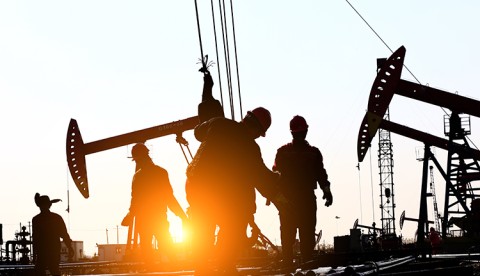Venezuela is pushing for a new agreement between OPEC and non-OPEC nations to stabilize oil prices, President Nicolas Maduro said on Friday, in the most serious indication yet of a renewed drive to boost prices back to $100 per barrel.
Cash-strapped Venezuela has been a historic price hawk, and a severe recession and product shortages have heightened Maduro’s need for a market recovery.
“We’re currently working on a deal that hopefully can materialize in June regarding an announcement between OPEC and some of the most important (oil) producers in the world to finish stabilizing the market in the second half of the year,” he said after a meeting with Qatar’s emir.
It is unclear how successful these efforts may be now, with global Brent prices having rebounded by nearly 50 percent from their January lows to more than $65 a barrel.
His comments come a month after Russian officials said they had been in “unprecedentedly” active consultation with OPEC nations, although there has been no tangible result from those discussions.
Officials from Russia, the world’s second-largest producer, have given no sign that they are willing to cut.
“It’s in the best interest of Venezuela and OPEC for the price of (oil) to stabilize at 100 (dollars) in the medium term,” said Maduro.
That view is at odds with many others in OPEC, with most saying they do not expect to see such prices for years to come. Some OPEC sources have suggested the group’s core Gulf members are hoping for crude to equalize at around $70 a barrel, in line with what analysts are currently projecting for 2016.
Maduro himself said in January prices would not return to 0, and told citizens, “God will provide.
”
The Organization of the Petroleum Exporting Countries meets on June 5 in Vienna. The group in November shot down calls by price hawks including Venezuela for an output cut.
Ali al-Naimi, the oil minister of OPEC kingpin Saudi Arabia, has said in recent months that he is open to cooperating with non-OPEC producers to stabilize the market, but that OPEC will no longer cut output without other nations joining in.
While OPEC and non-OPEC nations agreed to joint output cuts 15 years ago to revive prices that had tumbled to $10 a barrel, many analysts doubt they have the political will to do so again – and wonder if Gulf members would trust any pledges to pump less.
Source: Reuters











